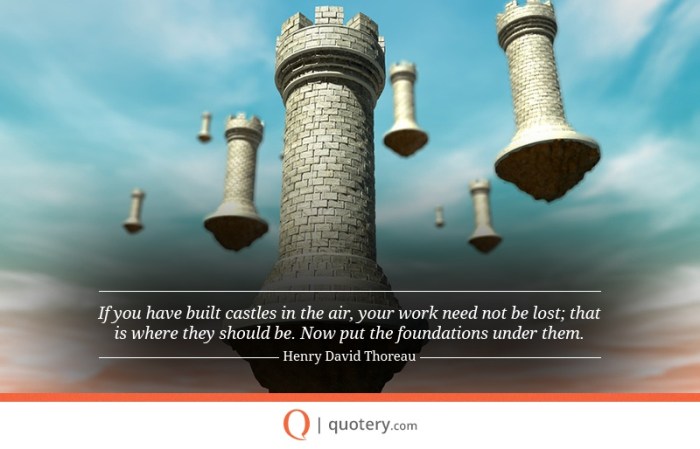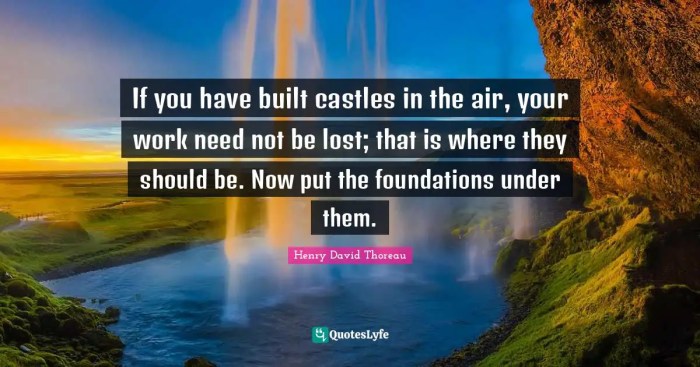Thoreau quotes on self reliance – Thoreau’s Enduring Legacy: Quotes on Self-Reliance explores the profound insights of Henry David Thoreau, a renowned American naturalist, writer, and philosopher, on the transformative power of self-reliance. Through his writings and experiences, Thoreau eloquently articulated the significance of self-sufficiency, independence, and the pursuit of one’s own path.
Thoreau believed that self-reliance was not merely a desirable trait but an essential component of a meaningful and fulfilling life. He argued that by embracing self-reliance, individuals could liberate themselves from the constraints of society and achieve a deeper connection with nature and their true selves.
Thoreau’s Concept of Self-Reliance
Thoreau believed that self-reliance is essential for personal growth and fulfillment. He argued that individuals should rely on their own judgment and experience rather than conforming to societal norms or the opinions of others.
Examples of Thoreau’s Self-Reliance
Thoreau practiced self-reliance in many aspects of his life. He lived simply and frugally at Walden Pond, relying on his own resources for food and shelter. He also refused to pay taxes to the government, which he believed was unjust and oppressive.
Benefits of Self-Reliance
According to Thoreau, self-reliance has several benefits, including:
- Increased independence and autonomy
- Enhanced self-confidence and self-esteem
- Greater resilience and adaptability in the face of challenges
The Relationship Between Self-Reliance and Nature: Thoreau Quotes On Self Reliance

Thoreau’s philosophy of self-reliance is deeply intertwined with his reverence for the natural world. Spending extensive periods in nature, particularly at Walden Pond, fostered his self-sufficiency and independence.
Solitude and Self-Reliance
Solitude in nature played a crucial role in Thoreau’s development of self-reliance. Away from the distractions and expectations of society, he was able to connect with his inner self and cultivate a sense of independence.
- Solitude allowed Thoreau to observe and learn from nature’s rhythms and cycles, gaining insights into the interconnectedness of all living things.
- By embracing solitude, Thoreau discovered the importance of self-sufficiency and the ability to rely on one’s own resources.
Nature as a Teacher
Thoreau viewed nature as a teacher, offering valuable lessons in self-reliance. The natural world provided him with sustenance, shelter, and a constant source of inspiration.
- Through his immersion in nature, Thoreau learned the importance of observation, adaptability, and resilience.
- Nature’s challenges and rewards taught him the value of perseverance, patience, and a deep appreciation for the beauty and wonder of the world.
The Challenges of Achieving Self-Reliance

Thoreau’s pursuit of self-reliance was not without its challenges. He faced both internal and external obstacles that tested his resolve and resilience.
One significant challenge was his own self-doubt. Thoreau struggled with feelings of inadequacy and uncertainty, especially in the early stages of his journey towards self-reliance. He questioned his abilities and worthiness, doubting whether he could truly live a life of independence and self-sufficiency.
Overcoming Self-Doubt
To overcome these doubts, Thoreau relied on introspection and self-reflection. He spent time alone in nature, where he could connect with his inner thoughts and feelings. Through this process, he gained a deeper understanding of his strengths and weaknesses, and gradually developed a stronger sense of self-belief.
Thoreau also sought support from like-minded individuals. He surrounded himself with friends and mentors who shared his values and aspirations, and who provided him with encouragement and guidance. This support system helped him to stay motivated and focused on his path.
External Challenges
In addition to his internal struggles, Thoreau also faced external challenges that threatened his pursuit of self-reliance. These included financial difficulties, social isolation, and the disapproval of others.
To overcome these external challenges, Thoreau adopted a frugal lifestyle and lived simply. He reduced his expenses, grew his own food, and made do with what he had. This allowed him to maintain his independence and avoid relying on others for financial support.
Despite his social isolation, Thoreau remained connected to the world through his writing and correspondence. He shared his ideas and experiences with others, and gradually gained a following of supporters who admired his courage and independence.
Strategies for Overcoming Challenges to Self-Reliance
Based on Thoreau’s experiences, several strategies can be adopted to overcome challenges to self-reliance:
- Embrace self-reflection:Take time to understand your strengths and weaknesses, and develop a strong sense of self-belief.
- Seek support from others:Surround yourself with like-minded individuals who share your values and aspirations.
- Adopt a frugal lifestyle:Reduce your expenses and live simply to maintain your independence.
- Stay connected to the world:Share your ideas and experiences with others to gain support and encouragement.
The Impact of Self-Reliance on Society

Self-reliance is a cornerstone of a healthy society, fostering personal growth, community resilience, and economic prosperity. However, promoting self-reliance in modern society faces challenges due to factors such as technological advancements, societal interdependence, and cultural norms.
Self-reliance promotes personal responsibility, self-sufficiency, and a sense of accomplishment. It empowers individuals to make informed decisions, manage their resources effectively, and contribute meaningfully to society. Self-reliant individuals are less likely to rely on external assistance or government support, reducing societal burdens and promoting a culture of self-sufficiency.
Challenges of Promoting Self-Reliance in Modern Society
Promoting self-reliance in modern society presents several challenges:
- Technological advancements:While technology can enhance convenience and efficiency, it can also create dependencies and reduce opportunities for self-sufficiency. For example, the reliance on smartphones and the internet can diminish interpersonal skills and reduce physical activity.
- Societal interdependence:Modern society is characterized by a high level of interdependence, with individuals relying on specialized services and goods provided by others. This interdependence can foster a sense of entitlement and reduce the motivation for self-reliance.
- Cultural norms:Cultural norms can shape individuals’ attitudes towards self-reliance. In some cultures, collectivism and reliance on the community are highly valued, which may conflict with the promotion of self-reliance.
Fostering Self-Reliance in Communities, Thoreau quotes on self reliance
Fostering self-reliance in communities requires a multi-faceted approach:
- Education:Schools and educational programs can play a crucial role in promoting self-reliance by teaching students critical thinking, problem-solving skills, and financial literacy. Experiential learning opportunities, such as internships and community service, can also foster self-reliance by providing practical experience.
- Community initiatives:Community-based initiatives, such as neighborhood watch programs, community gardens, and skills-sharing workshops, can provide opportunities for individuals to develop self-reliance and connect with others.
- Government policies:Government policies can support self-reliance by encouraging entrepreneurship, providing access to resources, and promoting financial independence.
Contemporary Applications of Thoreau’s Ideas

In the modern world, Thoreau’s ideas on self-reliance continue to resonate and offer guidance for personal growth and societal progress. By fostering a spirit of independence, resilience, and connection with nature, self-reliance empowers individuals to navigate the challenges of the 21st century.
In the realm of personal development, self-reliance encourages individuals to take ownership of their lives, make informed decisions, and rely on their inner wisdom. It promotes self-sufficiency, enabling individuals to solve problems creatively and adapt to changing circumstances.
Applications in Personal Development
- Enhancing decision-making skills by trusting one’s own judgment and values.
- Developing emotional resilience and coping mechanisms to navigate personal challenges.
- Promoting personal growth through self-reflection and self-discovery.
Applications in Social and Environmental Issues
Thoreau’s principles can also be applied to address contemporary social and environmental issues. By embracing self-reliance, individuals can become more engaged in their communities and take responsibility for their impact on the planet.
- Fostering civic engagement and participation in decision-making processes.
- Promoting environmental stewardship and responsible consumption habits.
- Supporting sustainable living practices and reducing reliance on external resources.
Quick FAQs
What is the central message of Thoreau’s philosophy on self-reliance?
Thoreau believed that self-reliance is essential for personal growth and fulfillment. It involves trusting one’s own judgment, embracing solitude, and living in accordance with one’s own values.
How did Thoreau practice self-reliance in his own life?
Thoreau spent two years living in a cabin in the woods at Walden Pond, where he practiced self-sufficiency and immersed himself in nature. He also engaged in civil disobedience, such as refusing to pay taxes, as a means of asserting his independence.
What are some of the benefits of self-reliance?
Self-reliance can lead to increased self-confidence, resilience, and a greater sense of purpose. It can also foster a deeper connection with nature and one’s own inner self.